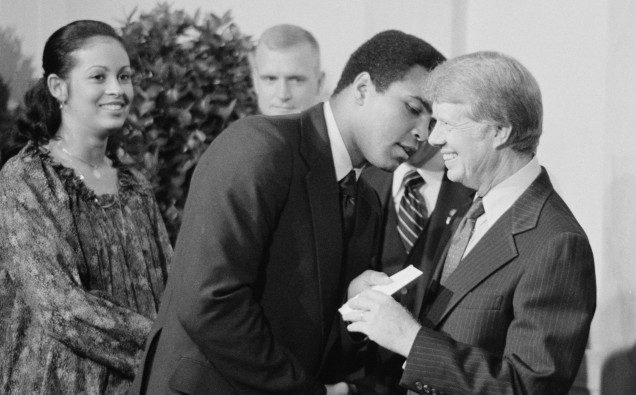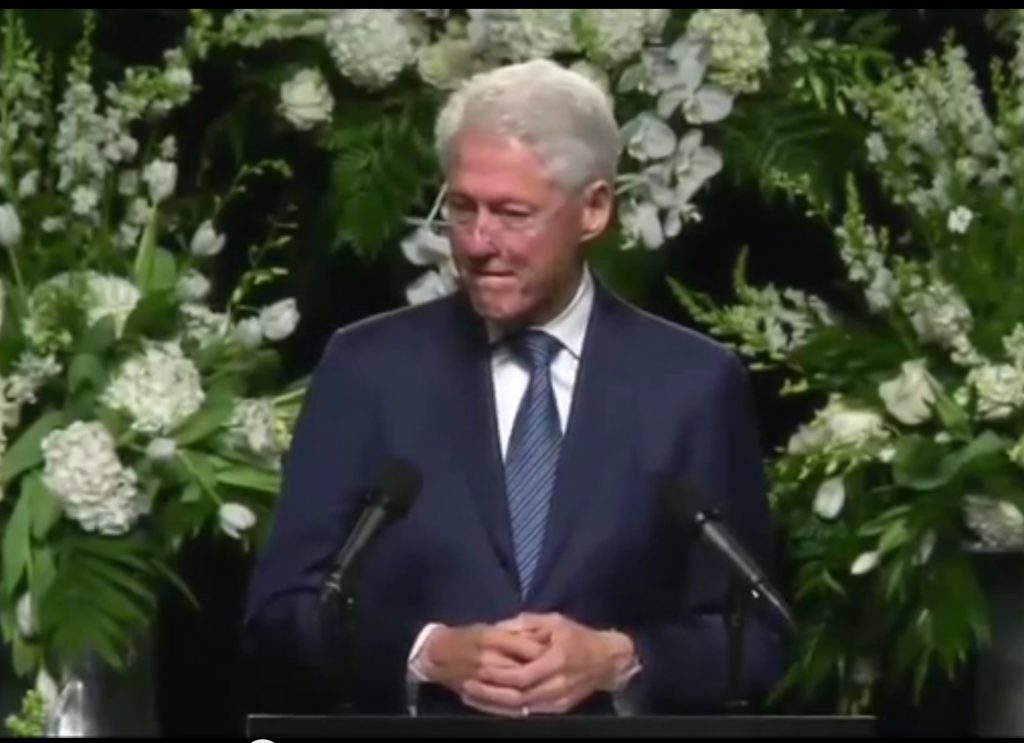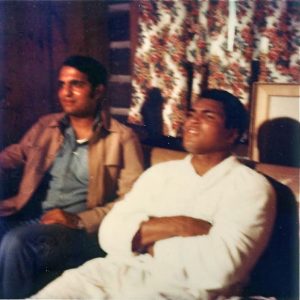
Photo by Trikosko, Marion S./Wikimedia Commons
How to describe legacy of the man who embodied so many attributes of human greatness, and whose achievements transcend borders and eras and continue to inspire so many millions?
In fact, a befitting account of all accomplishments of Muhammad Ali – who passed away this year on June 3 – will be as monumental an attempt as his feats – nothing less than celebrating a life of immortality, honor and affinity, and all this with a fighting spirit.
But understanding the indomitable spirit that Muhammad Ali symbolizes as boxer, sociopolitical critic, courageous voice for peace, love and equality, remains relevant because the man who would “float like a butterfly and sting like a bee” inside the boxing ring, was one of the most admired and influential figures outside the arena.
A look at how people, who knew Ali closely and spent time with him, were able to describe Ali in when he passed away may help illustrate what the champion of the people achieved and stood for.
George Foreman, who lost the now fabled, The Rumble in the Jungle fight to Ali on October 29, 1974 in Kinshasa, Zaire, wrote upon learning of Ali’s demise:
“It’s like a part of me just passed w/ him. It’s hard for me to think about being in a world without Muhammad Ali being alive.”
And then he echoed what Ali would often say – Black is beautiful – to infuse a new spirit and confidence among African Americans as they struggled during the civil rights movement.
“Until Ali no one said “I’m beautiful” he was royalty, yet common man was his pal. That is beauty. Greatest kind.”
Former President Bill Clinton called Ali a “universal soldier for our common humanity,” and a “free man of faith,” in an emotional eulogy for his friend, and champion of the people, who lined the Louisville streets to say farewell to Ali with flowers and gratitude.
In 1996 during his presidency, Clinton had honored Ali by inviting him to light the Atlanta Olympic Games flame.
“I think he decided something that I hope every young person here will decide, I think he decided very young to write his own life story,” Clinton said.
“I think he decided before he could have possibly worked it all out and before fate and time could work their will on him, he decided he would never be disempowered, he decided not his grace nor his place nor the expectations of others would strip from him the power to write his own story,” Clinton continued.
Clinton also praised Ali for not bowing to Parkinson’s disease.
“He refused to be imprisoned by his disease that kept him hamstrung longer than Nelson Mandela was imprisoned in South Africa.”
Louisville Mayor Greg Fischer gave expression to the awe, wonder and tribute of countless millions, who wonder about the epic achievements of Muhammad Ali.
“Muhammad Ali lived a life so big and bold, it’s hard to believe that any one man could do everything he did, could be all the things that he became in the course of just one lifetime,” Fischer said, as Louisville, the champ’s hometown.
Mowahid Hussain Shah, a Pakistani writer and attorney-at-law and Middle Eastern affairs expert, who met with Ali in 1978, wrote that in his imagination the champ “shall remain forever young.”
“Ali was a God-fearing humanitarian, giving lavishly to charity. Instead of mobilizing anxieties, he mobilized hope. Even at the zenith of his powers, he was accessible to the average guy. He combined the audacity of youth with the serene tenacity of a dervish.
“When he resisted being forcibly conscripted for America’s war in Vietnam, he was presented with two choices: go to Army or go to jail. Ali’s response: there is a third choice – justice. Defeatism was never a part of his DNA. Adversity only made Ali stronger. For Muslims today, his life is a living inspiration to reach for the sky.”
One of the greatest tributes came from Bob Dylan, singer and songwriter, who was this year awarded the Nobel Prize in Literature.
“If the measure of greatness is to gladden the heart of every human being on the face of the earth, then he truly was the greatest. In every way he was the bravest, the kindest and the most excellent of men.”
However great, filled with true emotions and intellectually honest, these tributes do not appear big enough to encompass everything the champ represented. Only a fighting spirit like Muhammad Ali, who carved out a life of empowerment, love and immortality, can in Clinton’s words write his own story.
But in the face of current challenges, Muhammad Ali’s life as a philanthropist, peace activist, a voice for inclusiveness and an American who believed nothing was impossible, holds much instructive value, especially now that time has vindicated his stances against war and discrimination.
The Muhammad Ali Institute for Peace and Justice at the University of Louisville sounds very true of what the champ stood for. The name of the Institute represents democratic values like freedoms and equality, which are fundamental to letting everyone have the opportunity to realize the American Dream.
The article originally appeared in Views and News on December 31, 2016


















